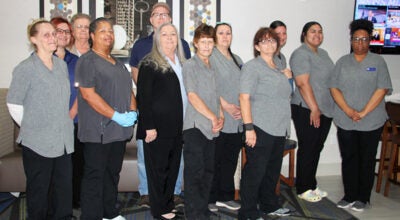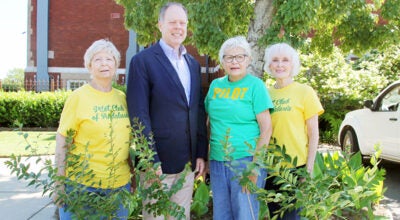Remembering a son
Published 2:02 am Saturday, September 26, 2009
When he was a boy, Sgt. Robert David Gordon II loved G.I. Joes.
Diane Gordon said her son was 3 when he first showed his affinity for the action figure he would emulate later in his life. At the time, his family was stationed in the Panama Canal where his father was serving in the U.S. Army.
“He had his little friend that lived behind us, and they would be out there playing G.I. Joes,” she said. “If I had all the money we spent on G.I. Joes, I’d be set. But it carried through until the age until he could sign up on his own.”
David lost his father, Robert Gordon, at a young age, and was reared by his mother, and arguably the community of Red Level, where he attended school.
David, who lived in River Falls, was described by fellow classmates as a kind, fun-loving and easy-going person. As soon as he turned 18, the Red Level High School senior joined the U.S. Army.
“There was never any doubt about what David was going to do,” Gordon said. “We always knew he was going into the military. He put on a tough front for his friends, but deep down, he was such a sweet, sweet boy. He was an infantryman in the Army. His daddy was an infantryman, so that made up his mind.”
David was assigned to Fort Lewis in Pierce County, Wash., and was a member of the 5th Stryker Brigade Combat Team, 2nd Infantry Division, which was deployed to Afghanistan in July. He had recently re-enlisted with the U.S. Army for six more years and was quickly rising through the Army ranks, achieving his sergeant stripes. As the War on Terror progressed, it was inevitable he would make his way overseas. It was there David encountered the one enemy he wasn’t trained to fight against, and the one that eventually took his life — a tick.
It happened while he was stationed near Afghanistan’s capital of Kabul, while Gordon was apparently in the countryside with goat herdsmen and was bitten.
Gordon said she never had any indication her son wasn’t feeling well. She hadn’t spoken with him since the first part of August but did get an e-mail from him on Aug. 22.
When the phone rang at 5:30 a.m. on Fri., Sept. 11, she had no idea what news the voice on the other side was about to deliver.
“They said they had (evacuated) him from Afghanistan to Germany and that he was in the hospital,” she said. “That was it. No other information. I was thinking, ‘Well, he’s sick. He’s going to be fine.’
“Later, the doctor from Germany called and said he was critical and in ICU but stable,” she said. “I got a little worried after that, but the next day by 9 p.m. I was in Washington getting my passport so I could go see him. Still I was thinking, ‘He’s got pneumonia or something. He’ll be bad sick for a few days and then get to come home.’ ”
Gordon said by the time she and her son Charlie arrived in Germany on Sun., Sept. 13, they were greeted with the news that Gordon “probably wouldn’t make it.”
Unfortunately, those doctors were right.
Doctors say David contracted the rare Crimean-Congo hemorrhagic fever (CCHF) virus, which eventually led to many complications from which his body couldn’t recover. He died the following Wednesday, Sept. 16. He was 22.
Now, all Gordon has left is those few G.I. Joes her son loved so much and the memories of how he would call her on every birthday to remind her how old she was.
“David always knew what he was going to do,” she said. “I said, ‘The timing … why don’t you hold off? There’s a war going on.’ No, he said. It had to be right then.
“That’s the kind of person he was,” she said. “He was a shy sweet boy. He had a mischievous streak, and when he made up his mind, that was it. I know that he did what he always dreamed he would do — be a soldier. I’m proud of him for that.
“David knew from a small age where he was going. He stepped in at a small age and went,” she said. “And it led us to where we are today.”




